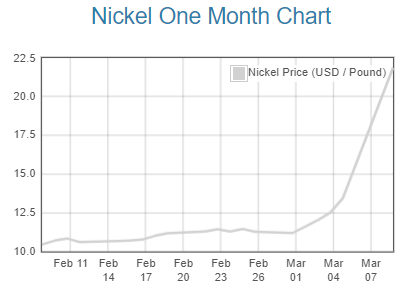The focus of today’s piece is separating the leading data we are getting from the laggard. Those business owners who focus on the lagging data will miss turns in business trends (such as supply chain efficiency).
Employment Lags
An example of lagging data is employment-related information. Companies tend to hire at the end of the good times in their industry (this is also when inflation is the highest). While rising employment and wages are good for the economy, they are poor timing indicators.
The Ukraine Conflict’s political and military situation is inescapable. Further, Europe is in a recession now. The recession will be far worse if they get 2-4 weeks of cold weather over the next month. That kind of weather improves the negotiating ability of Russia even more.
Commodity Prices Lead The Economy
The business aspects of the conflict are very real and impact US businesses already. Both Russia and Ukraine are major exporters of commodities. Corn, Wheat, Palladium (use in car’s catalytic converters), fertilizers, & Nickel are huge exports. Oil and Natural Gas are too.
Here in California, we use imported crude oil in local refineries. Refiners combine heavy crude with lighter US crude to improve refining efficiency. Thus, the administration is “talking nice” to Venezuela right now. There’s a big hole left with the loss of Russian crude supply. Of the world’s 100 million barrels/day thirst for oil, Russia provides about 10%. With Russia out of the market, and adjustable production at 1-2 million barrels/day, you end with about a 9 million barrel a day shortfall. For comparison, Saudi Arabia’s whole production in 2020 was 11 million barrels/day.
Shipping and financial disruptions affect commodity prices too. The global sanctions on Russia have already harmed commodity ownership and deliveries. Ports in Europe and the Americas are refusing to unload cargo if even a small part of it originated from Russia. International cargo, container, bulk commodity ships, and crude carriers often stop at many ports on trips. Russian-owned vessels are being seized as part of the sanctions (both those of private citizens and company ones).
Even if you do quickly onshore you and your subs operations, you still need the input materials. Those commodities mentioned earlier need to get to the US (and off the ship). Let’s discuss nickel as an example.
Nickel is used in both Stainless and Alloy Steel and is also used to plate (coat) other metals for corrosions resistance. It is used heavily in the manufacturing of cars, boats, containers, cooking utensils, medical equipment, and in laptop/mobile device/car batteries. It would be difficult for you to avoid contact with the metal for more than a few minutes. It is everywhere.
In London, there are trading and registered warehouse operations that are part of the London Metal Exchange. Supplies have fallen and demand has risen. Here is a price chart:
https://www.dailymetalprice.com/metalprices.php?c=ni&u=lb&d=20
Now, the most prominent marketplace in the world is the London Metals Exchange. This exchange closed on Monday and canceled trades for that day. Many tons of nickel are in limbo as to ownership, physical access, and delivery. Over $10 billion in losses have been announced in just two days. Russia is the largest producer of nickel.
It’s Banks (And Not Just Banks)
There are signs of stress in bank funding too. Short-term bank deposits costs have risen in yield.
Trade finance is a mess, as the ability of shippers to finance and insure Russian cargos is gone. Ural crude only saw one delivery last week, and the buyer got a $28/barrel discount in price to take it.
We anticipated distress this quarter, in banking. The Ukraine conflict made it far worse. There is still adequate liquidity at banks for loans. Yet, we do expect they will prefer higher-grade loan customers in Q2.
What To Do Now
It is too late to increase business insurance, as many policies have exemptions for war-related claims. Having significant cash unused lines of credit makes a huge amount of sense.
Get a plan in place to cover disruptions and “just-in-case” inventory orders now. Few people really know what’s going on in this conflict. That’s why it is called “the fog of war.”
As you drive home, look at the wheels of the cars next to you. Chances are good those bolts (lug nuts) holding the wheel on are nickel-plated.
Keep the wheels of your company on, with sufficient inventory. Call us about expanding business credit lines and getting more than just the supplies you need. This is not a marketing statement. We’re offering manufacturers a parachute.
Who refuses a parachute?
Diamant Carré Newsletter
P.S. – if you find these comments helpful, sign up here to get our notes immediately by email. Additionally, you’ll get our upcoming “Square Deals” webinar schedule, where we interview interesting business leaders.
Diamant Carré has the depth of market knowledge, insights, and a hand on the “pulse” of financial information you need now. Start us cutting through the clutter of your competition and get you timely funding.
Photo by Pedro Henrique Santos on Unsplash

